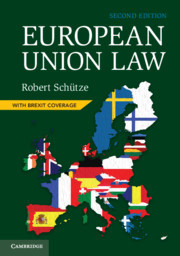Description
European Union Law (2nd Ed.)
Author: Schütze Robert
Language: English
Subject for European Union Law:
Approximative price 52.22 €
In Print (Delivery period: 14 days).
Add to cart
Publication date: 08-2018
1018 p. · 17.2x24.7 cm · Paperback
1018 p. · 17.2x24.7 cm · Paperback
Description
/li>Contents
/li>Biography
/li>
European law has come to influence almost all fields of national law, including administrative, constitutional, contract, criminal and even tort law. But what is the European Union? How does it work? How does it produce European law? This book uses a clear framework to guide readers through all core constitutional and substantive topics of EU law. New content includes: a Brexit chapter covering the negotiation process and the possible future relationships between the United Kingdom and the European Union, new EU private international law and EU criminal law sections, extended coverage of delegated legislation, human rights and free movement of persons. All chapters reflect judicial and legislative practice up to 31st December 2017. Key features: case extracts accompanied by extensive critical discussion of the theoretical and practical aspects of EU law, over 100 figures and tables clarifying complex topics and a companion website with full 'Lisbonised' versions of cited cases and many extra materials.
Part I. Constitutional Foundations: 1. Constitutional history: from Paris to Lisbon; 2. Constitutional nature: a federation of states; 3. European law I: nature – direct effect; 4. European law II: nature – supremacy/pre-emption; 5. Governmental structure: Union institutions I; 6. Governmental structure: Union institutions II; Part II. Governmental Powers: 7. Legislative powers: competences and procedures; 8. External powers: competences and procedures; 9. Executive powers: competences and procedures; 10. Judicial powers I: (centralised) European procedures; 11. Judicial powers II: (decentralised) national procedures; 12. Judicial powers III: EU fundamental rights; Part III. Substantive Law: 13. Free movement of goods I: negative integration; 14. Free movement of goods II: positive integration; 15. Free movement of persons: workers and beyond; 16. Free movement of services and capital; 17. Competition law: private undertakings; 18. Internal policies: an overview; 19. Brexit and the Union: past, present, future; 20. Appendices: how to study European law.
Robert Schütze is Professor of European Law at the University of Durham and Visiting Professor at the College of Europe, Bruges and at the Libera Università Internazionale degli Studi Sociali 'Guido Carli', Rome (LUISS).
© 2024 LAVOISIER S.A.S.
These books may interest you

European Union Law 127.71 €

European Constitutional Law 47.09 €

European Constitutional Law 98.14 €

